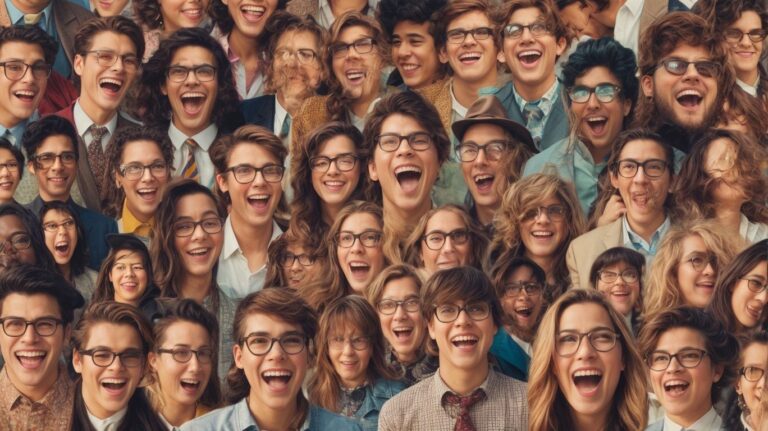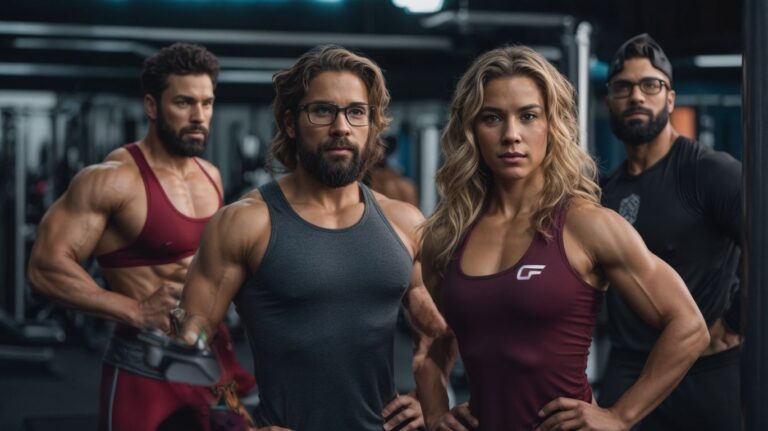Geek and Gorgeous: Breaking Stereotypes in Today’s Pop Culture
What are the Common Stereotypes about Geeks and Gorgeous?
Stereotypes about geeks and gorgeous are widespread in our society today – and in some cases have been held for decades. Geeks are often thought of as introverted, socially awkward individuals who are more comfortable spending their time indoors playing video games or glued to their computers.
Conversely, they’re often seen as highly intelligent and bookish in appearance, wearing glasses and having an obsessive knowledge of films, technology, or science fiction. On the other hand, gorgeous are generally portrayed as people who are attractive and popular, but lacking in brains. They’re often viewed as shallow, superficial, and fashion-oriented. These stereotypes can be difficult to debunk and can have a negative impact on people of both genders who fall into either category.
Exploring the Impact of Pop Culture on Stereotypes
Pop culture can have a huge impact on the way we view subjects like geeks and gorgeous. We may have seen movies and TV shows that depict tech-savvy geniuses as eccentric while beautiful people are sometimes portrayed as vapid and materialistic. These images can shape our impressions of geeks and gorgeous, and often lead to the formation of stereotypes that are often unfounded.
Social media can also influence the way we perceive geeks and gorgeous. Social media platforms are loaded with images and videos of people we perceive to be either a geek or a gorgeous, and it’s very tempting to make judgements about them based on these snippets. We may make assumptions about their lives, their intelligence, or even their personalities, based on the few pictures we see. While this certainly shouldn’t be the case, it’s very easy to fall into these traps.
How Stereotypes Impact the Way We Think and Behave
Stereotypes not only shape the way we think and feel, but also the way we act. Stereotypes can lead people to think we should act or react in a certain way when presented with certain circumstances. Stereotyping can lead to prejudiced attitudes that affect how we perceive and behave towards each other. Stereotypes can also lead to assumptions about people’s abilities or personalities based on nothing more than their group identity. It can be hard to differentiate between fact and fiction when it comes to stereotypes. People tend to believe whatever they hear and are less likely to question what is being said, leading to further perpetuation of these beliefs.
These stereotypes have the potential to shape the way we look at others and even ourselves. People can internalize stereotypes and start to view themselves in a certain light, based on what they’ve heard or seen in pop culture. This can lead to people believing they are just not capable of achieving certain goals or even worse, that they don’t even deserve to try. It is important that we don’t let stereotypes affect our own sense of identity or our opinion of others. It is up to us to challenge ourselves to think beyond the box and look at things from someone else’s perspective.

Examining the Role of Technology in Shaping Stereotypes
Technology has become increasingly intertwined with the way we interact and perceive one another in recent decades. From an increasingly online world to social media affecting how we process information, technology plays a major role in how we interpret stereotypes about geeks and gorgeous. Technology has also blown open the doors to creating virtual and augmented realities where physical features no longer limit one’s perceived stereotypes.
Take for example, augmented reality technology where people can look like anyone they choose. Entirely new forms of self-expression can be found, allowing people to create an entire persona that could exist solely in the online space. Through this game-changing technology, physical appearance and real-world experience no longer dictate how people perceive a person or group, allowing individuals to exist outside of narrow stereotypes.
The Power of the Media in Shaping Stereotypes
The media has a powerful influence on our perception of various social groups. Stereotypes related to geeks and gorgeous can be formed and reinforced by media messaging and imagery. Media outlets have a great deal of power to create and spread negative and positive impressions of any group.
Newspapers, magazines, television, radio, and movies depict geeks and gorgeous in both positive and negative ways. For example, geeks can be portrayed as intelligent and hardworking while gorgeous can be portrayed as vapid and superficial. This kind of framing can deeply affect how we view these groups and how their behavior is perceived. People are likely to ascribe to the characteristics shown by media, thus solidifying the beliefs about geeks and gorgeous.
How Social Media Influences Perceptions of Geeks and Gorgeous
Social media plays an integral role in the formation of stereotypes. In recent years, platforms such as Instagram, Snapchat, YouTube, and TikTok have become more popular. On these platforms, people create and share content with each other that further reinforces the stereotypes. For example, the term ‘geek’ conjures up images of nerdy guys with glasses and braces and ‘gorgeous’ often refers to a stereotypical view of beautiful, perfect women. The power of these messages is potent and by sharing them widely, they become part of the social narrative.
Such stereotypes can be damaging and form a narrow and often unrealistic idea of beauty and success. This can have a knock-on effect in other areas of life, such as in the workplace. People often get pigeonholed and judged based on their appearance. Therefore, social media can have a powerful impact in shaping people’s perceptions and reinforcing the stereotypes that exist within our society.
How Advertising Portrays Geeks and Gorgeous
Advertising has become an effective tool to shape people’s attitudes and opinions towards different individuals. Geeks and gorgeous individuals can either be portrayed positively or negatively in ads. Many advertisers take advantage of stereotypes to promote their products, often portraying geeky and gorgeous people as extremely smart, if they are nerds, or as shallow and vapid, if they are gorgeous. This serves to play on the insecurities and aspirations of both geeky and gorgeous people, associating their self-worth with the product being advertised.
Ads aimed at the geeky demographic are typically humorous, and often feature a nerdy character as the star. On the other hand, ads featuring gorgeous people emphasize physical beauty, as well as designer items. By reinforcing the idea that physical beauty is superior, the media perpetuates the prevailing belief that attractiveness comes with advantages that outweigh those of other groups. This ultimately leads to further stereotyping and discrimination against those who do not fit a certain standard.
Examining the Influence of Movies and TV on Stereotypes
Movies and television are two of the most commonly consumed forms of media in our society today, and can have a powerful influence in shaping our perceptions and beliefs. The characters on our screens often become iconic representations of who we should be, what’s important and even how we should look and behave. From action heroes to fashionistas, the characters on our big and small screens often contribute to the creation of stereotypes about geeks and gorgeous people.
The visual elements in movies and television shows add to the impact of portraying stereotypes of different types of people. While some actors are able to challenge our preconceived notions, many stick to the trope and provide viewers with false and often outdated ideas about geeks and gorgeous people. These stereotypes can then be internalized by viewers, which can lead to discrimination and injustice. It is important to recognize the influence of film and television on how we think about geeks and gorgeous people, and strive to create more nuanced and authentic representations.
5 of TV’s Hottest Nerds
Opinions about who the hottest nerds on TV are can vary greatly among different people, as attractiveness is subjective. However, there are some characters on TV known for their nerdy persona and are also considered attractive by some audiences. Below is a list of five such characters, in no particular order:
- Sheldon Cooper (Jim Parsons) from “The Big Bang Theory”:
- Sheldon is known for his genius-level intellect and quirky personality. His character has a nerdy charm that some find endearing.
- Spencer Reid (Matthew Gray Gubler) from “Criminal Minds”:
- With his high IQ and boyish looks, Reid’s character combines intellectual brilliance with a certain level of physical attractiveness.
- Lexie Grey (Chyler Leigh) from “Grey’s Anatomy”:
- Lexie is often seen as a medical nerd and is admired for her intelligence, dedication, and looks.
- Felicity Smoak (Emily Bett Rickards) from “Arrow”:
- The character of Felicity is known for her computer wizardry, and many fans appreciate her nerdy yet stylish persona.
- Barry Allen/The Flash (Grant Gustin) from “The Flash”:
- Barry, a forensic scientist with super-speed abilities, has a nerdy side especially when it comes to science, and his youthful appearance adds to his appeal.
These characters have been admired for their intellectual prowess as well as their physical appeal, which makes them stand out as attractive nerds on TV.
Investigating the Impact of Music on Attitudes Towards Geeks and Gorgeous
Music has always been a huge influence in pop culture, and it’s no exception when it comes to shaping people’s attitudes towards geeks and gorgeous. There has been a lot of music that has used the contrasting image of a geek or a gorgeous as a way of making a statement and expressing an opinion. From punk songs about defying expectations to hip-hop bragging about beauty, these sorts of songs have helped to shape the way we think about geeks and gorgeous.
Not only does music reinforce existing stereotypes about geeks and gorgeous, but it may even be making some of them worse. There have been a number of songs that have used the term “geek” as an insult and glorified beauty, making it seem like geeks aren’t as important or desirable as gorgeous people. This sort of message can have a huge impact on the way society views geeks, and it’s something that should be taken seriously.
Analyzing the Impact of Video Games on Stereotypes
Video games have become a powerful tool to shape attitudes, beliefs, and stereotypes. They have been used to represent certain gender roles and depict characters in stereotypical settings. For example, side-scrolling shoot’em-up games may feature some female side-kicks who move about the game-world in provocative poses while typically masculine characters show aggressive behavior. This type of representation can be seen in all sorts of video games where gender stereotypes are often perpetuated without scrutiny.
For some people, the stereotypes found in video games can be problematic as they may find themselves over-identifying with the characters. This is especially true for gamers who are looking for representation but find outdated standards in videogames they play. Unfortunately, this can contribute to the non-inclusive environment we often experience today. As the gaming industry looks to the future, developers should strive to ensure that games feature realistic depictions of people in all their unique forms.
Exploring the Effects of Gender Stereotypes on Geeks and Gorgeous
Gender stereotypes abound in popular culture when it comes to geeks and gorgeous. Geeks are often perceived as being awkward and unattractive, while gorgeous people are depicted as having all the physical power and beauty. Men who identify with the geek label are often seen as effeminate, while women who embrace the label are perceived as being too independent or ‘unfeminine’. This type of stereotype can be particularly damaging for those who are otherwise interested in embracing geekdom.
Gender stereotypes are embedded in various forms of media, including television, movies, and music. This type of media is often used to promote certain types of behaviour or desirability, and often reinforces gender biases. Even within the geek culture, there is often a tendency to segregate by gender. For example, superhero movies tend to focus on male characters, downplaying female protagonists. As a result, geeks and gorgeous people of both genders are often put into narrowly defined boxes based on their gender. This can be harmful to those who do not fit into the traditional roles or dress codes associated with gender.
Ways to Challenge and Dispel Stereotypes About Geeks and Gorgeous
When it comes to challenging stereotypes about ‘geeks’ and ‘gorgeous’ people, there are a few different strategies that can be employed. Firstly, individuals should strive to be conscious of language used to describe others. Using terms that reinforce negative images can have a lasting impact, so it’s important to be aware of how our words are used. Secondly, individuals can actively look for and celebrate members of different groups who are change makers—those who break the barriers of stereotypes and redefine the accepted ‘norms.
Additionally, being willing to challenge negative comments, criticisms and bias in the media, and taking the time to research facts before forming an opinion, can go a long way towards breaking down preconceived notions. Finally, it is a good idea to establish an open dialog about issues related to stereotypes to allow for greater inclusivity and acceptance of diversity. All of these methods are effective ways to challenge and dispel stereotypes about geeks and gorgeous people.
Looking to the Future: Breaking Down Stereotypes for the Next Generation
In order to create a world without stereotypes, we need to focus on education and raising awareness in the future generations. It’s important to challenge and dispel negative stereotypes while introducing positive, accurate ones. Educational institutions can help by providing lessons on topics such as self-love, diversity, and acceptance of all genders, ages, races, and sexual orientations. School activities fostered in an inclusive environment can help break down existing stereotypes and promote diverse thinking. Additionally, the media plays a huge role in improving attitudes towards Geeks and Gorgeous by helping to shape public perceptions. Movies and TV shows can be role models that promote positive stereotypes about Geeks and Gorgeous, and casting people from different backgrounds and ethnicities can help challenge existing stereotypes. Social media platforms can also be used to spread messages of inclusion and acceptance, as well as to help dismantle any existing negative stereotypes.
Above all else, good examples of Geeks and Gorgeous need to be celebrated and embraced. People can take action by creating and sharing blogs, articles, and videos that highlight the positive attributes of these two groups. It is only by uplifting Geeks and Gorgeous that we can truly hope to end negative stereotypes and create a better tomorrow for our future generations.
- The Dinosaur T-Rex Running Game - 5 November 2023
- Simon Says Remember: The Classic Simon Electronic Game - 5 November 2023
- AppleCare Cancelled? Now What? - 4 November 2023







